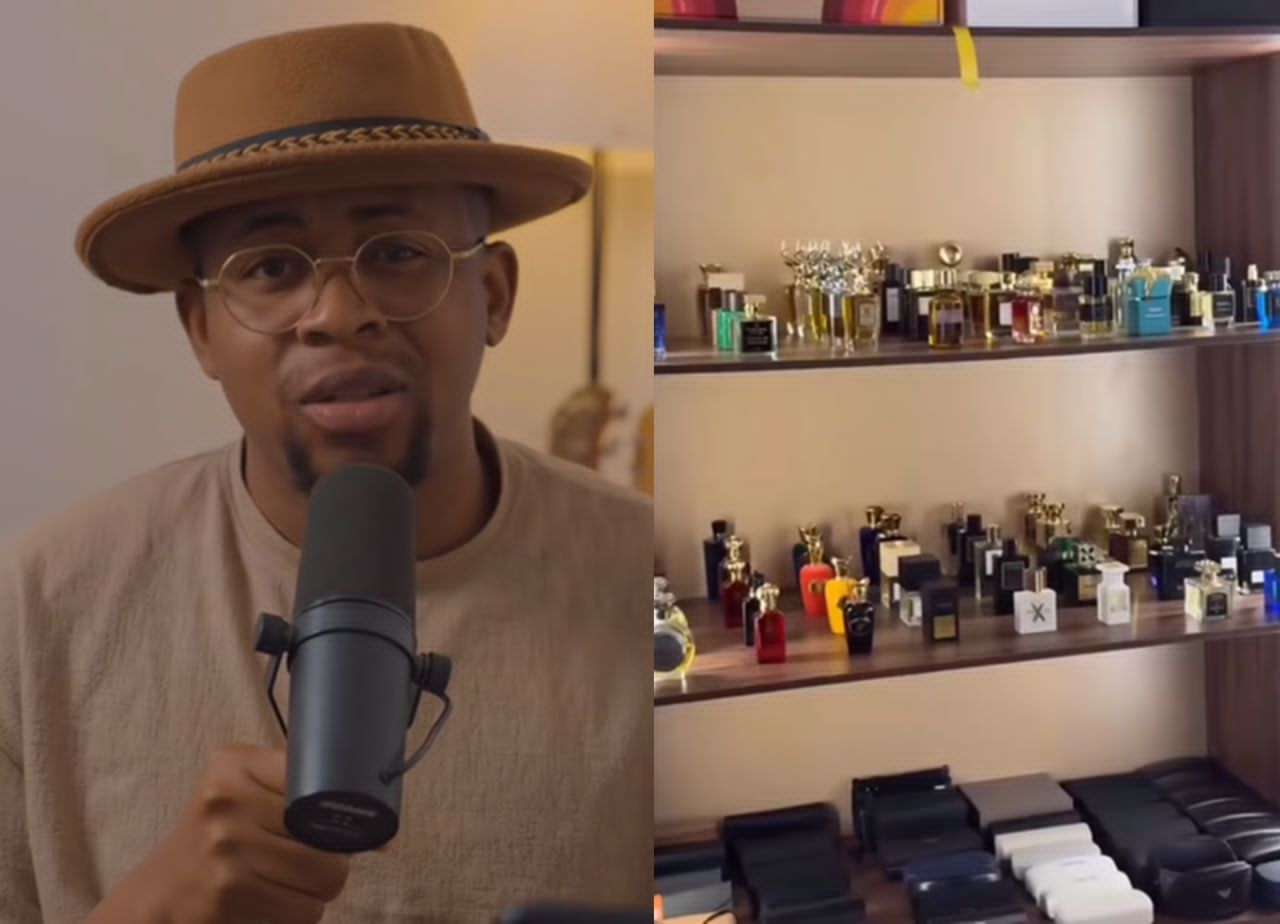
40 Bottles of Excess? Solomon Buchi Slams Mr Macaroni Over Perfume Obsession

In an era where personal brand and luxury collections are often used as symbols of success, a recent online confrontation has stirred a debate about consumerism, identity, and the true cost of glorified abundance. Nigerian life coach and social commentator Solomon Buchi has set social media ablaze with his blunt reaction to a video showcasing comedian Mr Macaroni’s impressive perfume collection.
“Nobody needs 40 perfumes, there’s nothing cute about it. We keep on glorifying consumerism,” Buchi wrote in a pointed response that has since gone viral. His comment came after Mr Macaroni, known for his comedic skits and signature line “You’re doing well!”, proudly displayed his wide array of luxury fragrances on Instagram. What was meant to be a lighthearted and perhaps aspirational look into the comedian’s private indulgences quickly spiraled into a public debate on materialism and values.
Social media, as expected, became a battleground of opinions. On one side were fans and followers praising Mr Macaroni for enjoying the fruits of his labor and choosing to spend his money on things he loves. On the other were those who sided with Buchi, arguing that the obsession with acquiring excess—especially when flaunted online—sends the wrong message in a society already grappling with poverty, unemployment, and insecurity.
Solomon Buchi has never been one to shy away from controversy or unpopular opinions. Known for his often philosophical takes on morality, relationships, and culture, Buchi’s words cut through the gloss of social media with an urgency that resonated with many. To him, the issue wasn’t just about perfumes—it was a symptom of a broader problem: the uncritical worship of wealth and possessions.
“We’ve reached a point where we equate self-worth with how many designer items someone owns,” one of his subsequent tweets read. “It’s dangerous. We are feeding a generation on visual success instead of substantial values.”
Mr Macaroni, whose real name is Debo Adebayo, did not directly respond to Buchi’s remarks. However, supporters of the comedian were quick to defend his lifestyle, noting his philanthropic work, vocal activism during the #EndSARS movement, and his consistent use of his platform to advocate for good governance and youth empowerment. For them, his perfume collection is a harmless indulgence—a reward for years of hard work and resilience in a tough industry.
But Buchi’s critique struck a nerve beyond just celebrity culture. Many online users began to question their own patterns of consumption. “I have five perfumes and even that feels excessive sometimes,” one user commented. “What are we really trying to prove with these purchases?” Others saw the viral moment as an opportunity for self-reflection and a reset of priorities.
The incident also reignited conversations about influence and responsibility. When public figures with large followings showcase their wealth, does it inspire or mislead? Does it motivate young fans or subtly pressure them into chasing material benchmarks? For Buchi, the answers seem clear. His stance is rooted in the belief that character, integrity, and meaningful impact should outweigh displays of affluence.
What makes this moment particularly significant is the cultural context in which it is unfolding. Nigeria, Africa’s most populous nation, is grappling with record inflation, rising living costs, and widespread economic uncertainty. For many citizens, owning just one bottle of perfume from a luxury brand is a distant dream, let alone maintaining a collection that likely runs into millions of naira.
In such an environment, Buchi argues, flaunting luxury can feel tone-deaf—especially from those who have built their brand on being “of the people.” It sends a message, intentional or not, that happiness and success are tied to what one can buy rather than who one is or what one contributes.
Interestingly, some pointed out the irony in Buchi’s critique, noting that he, too, has built a personal brand that relies heavily on social media visibility and engagement. But he was quick to draw the line between sharing thoughts and showcasing possessions. “The internet is a mirror of our values,” he tweeted. “What we choose to amplify reveals more about our society than we think.”
Not everyone agreed with his tone or his message. Critics accused Buchi of being judgmental, of policing personal choices, and of veering into unnecessary moralism. They argued that personal finance is exactly that—personal—and that no one should be made to feel guilty for how they choose to enjoy their earnings. For them, a perfume collection is no different from a sneaker collection, a car garage, or a shelf full of books. It’s about passion, not pretense.
Still, the conversation shows no signs of slowing down. More influencers have weighed in, some agreeing that the culture of “soft life” and luxury flaunting has become excessive, while others defended the freedom to celebrate success however one chooses.
Beyond the perfume bottles and Instagram filters, what this episode has revealed is a growing tension between materialism and minimalism, between outward expressions of success and internal definitions of value. In a world where viral moments shape cultural narratives, Buchi’s comment has done more than just criticize a celebrity’s collection—it has held up a mirror to a society increasingly obsessed with more, faster, flashier.
Whether Mr Macaroni’s collection was “too much” or perfectly reasonable remains a matter of opinion. What’s certain is that the conversation it sparked will linger. It challenges us to ask deeper questions: What do we value? Why do we buy what we buy? And are we glorifying things that ultimately leave us empty?
As trends come and go and social media continues to showcase curated lives, perhaps the real takeaway isn’t about how many perfumes one owns, but whether our possessions own us.


